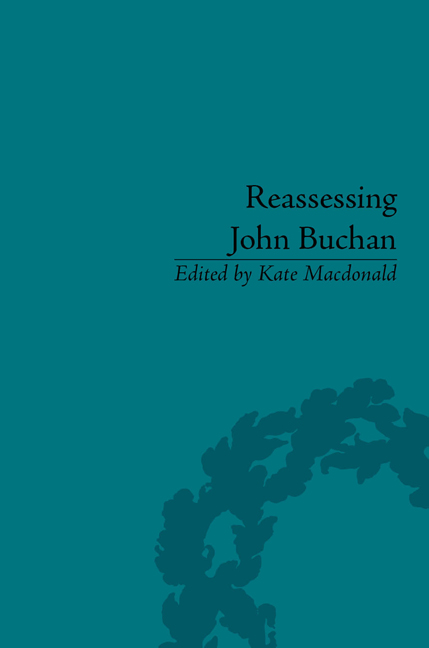Book contents
- Frontmatter
- CONTENTS
- List of contributors
- Introduction
- I Cultural Roots
- II Divided Loyalties
- 6 John Buchan and the South African War
- 7 John Buchan and the First World War: Fact into Fiction
- 8 Buchan and the Pacifists
- 9 John Buchan, America and the ‘British World’, 1904–40
- 10 Islam and the East in John Buchan's Novels
- 11 Conquistadors: Buchan's Businessmen
- III Literary Art
- Notes
- Works Cited
- Index
11 - Conquistadors: Buchan's Businessmen
from II - Divided Loyalties
- Frontmatter
- CONTENTS
- List of contributors
- Introduction
- I Cultural Roots
- II Divided Loyalties
- 6 John Buchan and the South African War
- 7 John Buchan and the First World War: Fact into Fiction
- 8 Buchan and the Pacifists
- 9 John Buchan, America and the ‘British World’, 1904–40
- 10 Islam and the East in John Buchan's Novels
- 11 Conquistadors: Buchan's Businessmen
- III Literary Art
- Notes
- Works Cited
- Index
Summary
The fictional British businessman of the twentieth century has received an uneven level of attention from historians debating the impact of cultural attitudes on economic performance.
Martin J. Wiener, who is most closely associated with the theory that the widespread propagation of an anti-industrial culture was a major factor in Britain's relative decline from its mid-Victorian economic peak, makes almost no analysis of the work of British novelists active in the early decades of the twentieth century. Given the spread of mass literacy that followed the 1870 Education Act, leading to an era in which written entertainment became increasingly central to national culture, this is an unexpected omission if the rural myth and the gentility creed were as pervasive as is claimed.
The literature of this period plays a greater part in the arguments of Professor Wiener's opponents. But in refuting the idea that culture is a key determinant of economic outcomes, W. D. Rubinstein concentrates on the anti-business literary virulence generated in economically triumphant America.
It is possible that a British analysis has been frustrated by a shortage of material. Neil McKendrick, who has paid closer attention to the fictional treatment of the British businessman, cites some eighty British writers who to a greater or lesser extent take business as a theme. Of these, however, only five were active in the first half of the twentieth century.
There is a sense that at a creative level the image of the businessman was fixed before the close of the Victorian period. Positive literary role models were then cancelled out not so much by continued artistic opposition as by the secondary effects of twentieth century literary criticism favourable to the negative school. Despite thematic outliers such as D. H. Lawrence and H. G. Wells, British novelists of the twentieth century increasingly disengaged from business. Even what McKendrick calls ‘Literary Luddism’ becomes less visible in their work, and in terms of theme the literature of the early twentieth century is just a brief stop on the line that starts with Hard Times in Coketown and ends in self-absorption On Chesil Beach.
- Type
- Chapter
- Information
- Reassessing John BuchanBeyond the Thirty Nine Steps, pp. 129 - 140Publisher: Pickering & ChattoFirst published in: 2014



